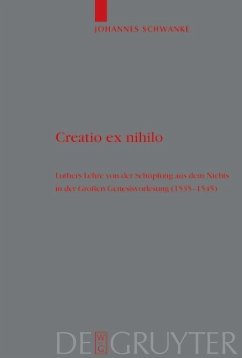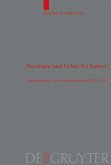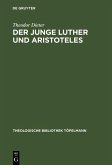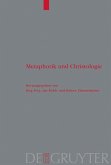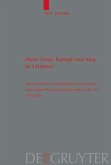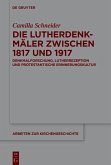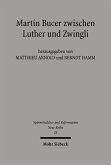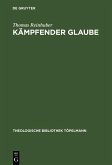Diese erste Monographie zu Luthers Lehre von der creatio ex nihilo zeigt den umfassenden Charakter seiner Interpretation der Formel, betont ihre Gegenwartsbedeutung und fragt nach theologischen und philosophischen Hintergründen. Spricht eine Schöpfung aus dem Nichts auch gegen jede Logik und Erfahrung, so zeigt der Verfasser ausgehend von Luthers Großer Genesisvorlesung, dass die Formel für Luther weder das kausale "Woher" der Schöpfung benennt noch das naturwissenschaftliche "Wie" ihrer Entstehung: Sie beantwortet vielmehr die Frage nach dem Verhältnis von Schöpfer und Geschöpf - in Schöpfung, Erhaltung und Neuschöpfung. Die Formel creatio ex nihilo ist damit keine periphere Bestimmung göttlichen Handelns, sondern Grundmatrix seines Umgangs mit Mensch und Welt.
Dieser Download kann aus rechtlichen Gründen nur mit Rechnungsadresse in A, B, BG, CY, CZ, D, DK, EW, E, FIN, F, GR, HR, H, IRL, I, LT, L, LR, M, NL, PL, P, R, S, SLO, SK ausgeliefert werden.
"To be created out of nothing is to be nothing without God. Dr. Schwanke's Dissertation shows how important this is for Luther and the Doctrine of Grace. His work is impressive and should provoke friendly discussion." Sir Henry Chadwick, Regius Professor em. of Divinity, of the Universities of Oxford and Cambridge
Armin Wenz in: Lutherische Beiträge 3/2009
"Das Buch von Johannes Schwanke schließt eien Lücke der Forschung."
Jürgen Bründl in: Theologische Revue 4/2006
"Ein wichtiger Beitrag zur Theologie Luthers."
Gerhard Müller in: Luther 2006
"This outstanding study of Luther's theology of creatio ex nihilo - the first monograph on this topic - offers a comprehensive interpretation of this central but neglected theme, combining remarkable erudition with appreciation for the scope and significance of Luther's thought. This is scholarship of the first rank: highly recommended."
Prof. Dr. John Webster, Lady Margaret Professor of Divinity, University of Oxford
"To be created out of nothing is to be nothing without God. Dr. Schwanke's Dissertation shows how important this is for Luther and the Doctrine of Grace. His work is impressive and should provoke friendly discussion."
Sir Henry Chadwick, Regius Professor em. of Divinity, of the Universities of Oxford and Cambridge

